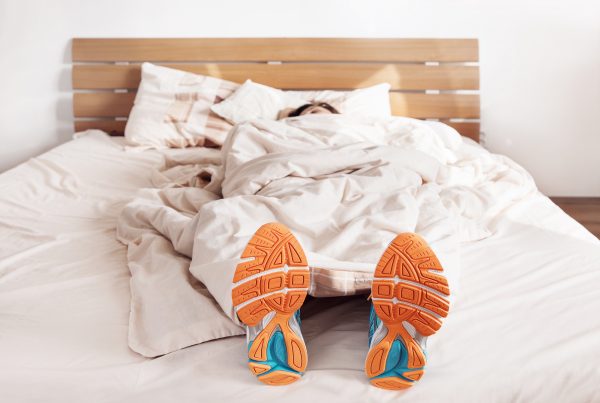”Connecticut, does your work schedule change your sleep? Many people who work the night shift have disordered sleep. This week's article offers strategies on how to still get good sleep. We hope you find this helpful!
Reading Time: 6 Minutes
MWi Hack:
- Learn how to combat the negative effects that shift work can have on your sleep.
MWi Summary:
- The best way to avoid shift work disorder is to create boundaries and routines around sleep, food, and exercise so your body can respond appropriately.
- You should go to sleep as close to the end of your shift as possible.
- Planning set times for meals and staying hydrated will help you get better sleep.
- There is not necessarily an ideal time to work out, but there are certain considerations to make whether you exercise before shift, mid-shift, or after your shift.
The human body has a natural inclination to anchor to cues in the environment, with sunlight and the day/night cycle being the most influential. Working at night prevents your body from latching on to this powerful cue and puts you at odds with your innate circadian rhythm.
Shift work sleep disorder affects many of us who work when our body believes it should be sleeping. Symptoms may include feeling sleepy when you need to be awake, insomnia when you try to fall asleep, sleep that is ineffective and unrefreshing, lack of energy, poor concentration, irritability, and even depression.
HOW TO COMBAT SHIFT WORK DISORDER
The best thing you can do is to establish very clear routines and behaviors associated with light exposure (sleep), fueling (diet), and exercise to provide predictable “anchors” your body can respond to. This will help your body understand what to expect next and will lessen the potential repercussions of working the night shift.
LIGHT ANCHOR: LOCK IN YOUR NIGHT SHIFT SLEEP SCHEDULE AND ROUTINE
- Avoid bright artificial and natural light exposure whenever possible up to 2 hours prior to bed.
- Go to bed as close to the end of your shift as you are able to. This is when you will have the strongest pressure for sleep. The longer you delay going to bed, the more awake you are likely to become.
- Set aside a block of 7 to 8 hours to dedicate to sleep.
- Keep the times you go to bed and wake up consistent, ideally within 1 hour each day if you can. Sleep consistency helps you get more REM and deep sleep (the restorative stages of sleep), and also improves your sleep efficiency.
- Create the right environment that is conducive for optimal sleep (dark, quiet, and cool).
- Establish a predictable pre-bed routine that signals to your body that it’s time to sleep. This can include things like a warm shower to decrease your core body temperature, winding down with a relaxing book, light stretching, and/or breath work, and writing in a journal to clear your head and reduce stress.
- Go outside after waking up, and make an effort to get in 20-30 minutes of natural light exposure.
FUELING ANCHOR: OPTIMIZE YOUR EATING HABITS FOR BETTER NIGHT SHIFT SLEEP
- Plan set times for meals and stick to that schedule as best you can.
- Drink water throughout your shift. Proper hydration helps you sleep better.
- Stay away from caffeine within 8 hours of when you intend to sleep.
- Consume nutrient rich, digestible foods, as well as foods containing vitamin D (cheese, yogurt, tofu, and salmon are good examples). The body normally absorbs most of its vitamin D from sunlight.
- Avoid meals just before bed. Have dinner at least 2-3 hours prior to when you intend to sleep. There is evidence to suggest that eating close to bedtime might divert resources away from recovery in favor of the effortful task of digestion.
- Limit alcohol (or skip it completely) within 3 hours of bed. While it may help you fall asleep, alcohol diminishes sleep quality and disturbs the deep stages of sleep, which will leave you unrefreshed the following day.
- Consider a light pre-bed snack high in serotonin. This can help you feel sleepy by promoting the production of the sleep hormone melatonin.
EXERCISE ANCHOR: WORK OUT WHEN IT FEELS BEST FOR YOU
Some things to take into consideration when deciding when the ideal time is for you to work out:
Before shift: Exercising when you wake up, before your night shift, could give you the burst of energy you need to get your workday underway. This can be beneficial to someone who normally is tired when it’s dark outside.
Mid shift: A night owl might not need to incorporate movement first thing upon waking up, but could benefit from an energizing run or resistance-training session during a mid-shift break.
After shift: Working out in the morning, following your shift, could help you become tired enough to fall asleep as the sun rises. Alternatively, morning exercise may energize you so much that you have trouble falling asleep right away. This might also be desirable if you prefer to wind down a bit before your daytime sleep. Eventually the fatiguing effects of the workout will kick in, and you will be able to fall asleep.
OTHER SLEEP TIPS FOR NIGHT SHIFT WORKERS
- Notify your friends and family of your working hours so that they do not disturb you when you’re trying to sleep.
- If it is your last shift in a block of night shifts, remember that the more days in a row that you have been working through the night, the more sleep debt you will likely have accrued.
- Repaying some of the sleep debt you’ve accumulated as quickly as possible will help you to recover faster.
- Work with your family unit to balance essential activities like shopping, housework, paying bills, and maintaining family time.
MWi would like to thank Kristen Holmes for her expert insights that we were able to share with our community. To read the original article go to:






